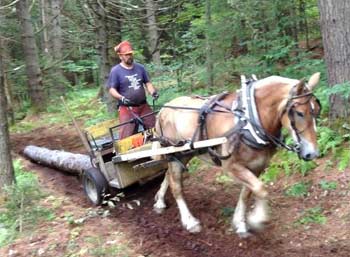This article was written by Patrick Ripley, Director of e-Commerce at VtSBDC
 Unlike many Vermont business owners, when Bethel logger Carl Russell emerged from the rains of hurricane Irene in late summer 2011, most of his inventory was left intact. But he had a different problem. He couldn’t get to it.
Unlike many Vermont business owners, when Bethel logger Carl Russell emerged from the rains of hurricane Irene in late summer 2011, most of his inventory was left intact. But he had a different problem. He couldn’t get to it.
“Basically the business virtually came to a stop for nearly 6 weeks,” Russell said. “We had logging jobs that could not produce because we could not get log trucks to the woodlots due to road destruction and reconstruction. We lost some value on logs that were ready for market prior to August twenty-eighth 2011, due to staining and aging from sitting around waiting to be moved to the mills,” he said.
Russell was able to eventually recover his logs and continue with his sustainable logging business. He uses draft horses to harvest logs from Vermont’s Green Mountains. The practice has less impact on the environment and allows him to log areas that may otherwise be inaccessible to modern logging methods. But as his business began to grow in the wake of Irene, he began to encounter a different problem. There was plenty of demand for the sustainably harvested logs he provides, but the time consuming nature of the process made supplying the logs difficult.
Russell enlisted the help of the Vermont Small Business Development Center (VtSBDC) to address the issue and quickly went to work establishing a business plan for a cooperative effort from all sustainable loggers across the state, to pool resources in hopes of meeting the ever increasing demand for the product. “Carl had a great idea. And he understood he needed to organize and focus his efforts,” said VtSBDC Director of e-Commerce Patrick Ripley.
“By helping us to expand our enterprise into a regional cooperative network, we will have more resiliency by not being restrained to merely local operations, operating around the impacted areas so to speak,” Russell said. “Also we hope that building capacity will also help in recovering from loss of time and product if/when it happens again,” he said.
Despite the traditional nature of his business, Russell did not shy away from emerging industry technologies that he thought could help him. In addition to his horses, he carries an iPad loaded with GPS and mapping software into the woods when he is evaluating timber lots.
“I had pretty good exposure to communication and marketing networks, but was lacking in some of the tools necessary to manage detailed inventory and forest management reports,” Russell said. “All of the fieldwork that I have done for years using clipboards and scribbled notes can now be managed with a mobile device that combines data collection and processing, document management, GPS/GIS, and visual detail with photography while providing in-the-field connectivity to web-based resources, and efficient transfer of information to other media for sharing and marketing,” he said.
With the help of the Vermont Digital Economy Project and the Small Business Development Center, Russell has fully integrated his mobile devices into his daily workflow. “Carl has embraced new mobile technology, which is really great to see since all indicators show this is the future of doing business in the digital age,” Ripley said.
“The assistance has been professional and accessible. Advice on how to integrate these new technologies into a new initiative to broaden the products and exposure of our services has been very helpful, and I am sure that it will prove critical in future success,” Russell said. “The folks at VtSBDC are very well-informed, comfortable, and professional. I have not had to work extra hard to get a response, and they have listened to my concerns in order to tailor their response to my needs. I feel that I have been helped in a way that suits my own personal interests, not directed to boiler-plate solutions.”
